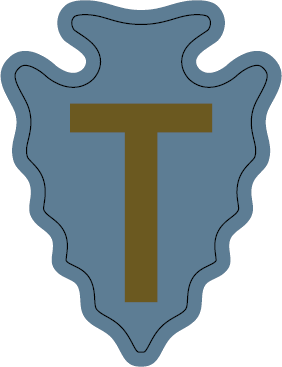36th Infantry Division Shoulder Sleeve Insignia
| Name | Euell Alvin Forbis |
|---|---|
| Gender | Male |
| Race | White |
| Age | 21 |
| Relationship to Draftee | Self (Head) |
| Birth Date | 11 Oct 1919 |
| Birth Place | Salem Shelby, Texas, USA |
| Residence Place | Appleby, Nacogdoches, Texas, USA |
| Registration Date | 16 Oct 1940 |
| Registration Place | Appleby, Nacogdoches, Texas, USA |
| Employer | Self |
| Height | 6 1 |
| Weight | 191 |
| Complexion | Light |
| Hair Color | Brown |
| Eye Color | Brown |
| Next of Kin | Joel Henderson Forbis |
Euell Alvin Forbis was born October 11, 1919 in Shelby County, Texas. The son of Joel Henderson Forbes (1880-1969) and Eula California Watson (1886-1953). He was reared on his parents farm in Nacogdoches County. He enlisted in the U.S. Army January 31, 1941. He was assigned to the 143 Infantry, 36th. Texas Division based at Camp Bowie in San Antonio, Texas. The division commanded by Major General Claude V. Birkhead, moved to Brownwood, Texas, on 1 June 1941, where it participated in the VIII Corps Brownwood Maneuvers until 13 June 1941. The division then returned to Camp Bowie. The division then moved to Mansfield, Louisiana, and took part in both the August and September 1941 Louisiana Maneuvers. The division, now commanded by Brigadier General Fred L. Walker, a Regular Army officer from Ohio and a distinguished veteran of World War I, then returned to Camp Bowie on 2 October 1941, where it was reorganized from a square division into a triangular division on 1 February 1942 and redesignated the 36th Infantry Division, just weeks after the American entry into World War II, as a result of the Japanese attack on Pearl Harbor on 7 December 1941, which was followed four days later by the German declaration of war against the United States. As a result of this reorganization, the 144th Infantry, plus numerous supporting units, were transferred out of the division. The division then moved to Camp Blanding, Florida, on 19 February 1942, and participated in the Carolina Maneuvers between 9 July 1942, and 15 August 1942. The division then was staged at Camp Edwards, Massachusetts, on 17 August 1942, for its port call to the European Theater Of Operations (ETO). During its time at Camp Edwards, the division conducted mock assaults of Martha's Vineyard Island in preparation for future amphibious operations. The division departed the New York Port of Embarkation (NYPOE) on 2 April 1943, for service in the Mediterranean Theater of Operations (MTO). The 36th Division landed in French North Africa on 13 April 1943, and trained at Arzew and Rabat. However, the training was hampered by the need to supply guards for some 25,000 Axis prisoners of war (POWs) who had surrendered at the conclusion of the Tunisian campaign in May. It was assigned to Major General Ernest J. Dawley's VI Corps, part of the Fifth Army, but attached to the Services of Supply, North African Theater of Operations, United States Army (NATOUSA), for supply. The 36th Division was originally intended to take part in the Allied invasion of Sicily, codenamed Operation Husky, but Lieutenant General George S. Patton the Seventh Army commander, preferred to use experienced troops instead and the 36th Division remained in North Africa. The Fifth Army was commanded by Lieutenant General Mark W. Clark, who knew the 36th Division well from his time as chief of staff to Lieutenant General Lesley J. McNair, commander of Army Ground Forces, and specifically chose the 36th Division, rather than the more experienced 34th Infantry Division, together with the British 46th and 56th Infantry Divisions, to spearhead the Allied assault landings at Salerno, Italy, which was given the codename of Operation Avalanche. Having missed out on the fighting in Sicily, the division first saw action in the Italian campaign, landing at Salerno on 9 September 1943. It was the first U.S. combat unit to fight on the European continent when it landed by sea at Paestum and fought in the Battle of Salerno against intense German opposition. The Germans launched numerous fierce counterattacks on 12–14 September, but the 36th, which at one stage during the battle was holding a 35-mile sector of the front (six times more than a full-strength infantry division was able to hold), repulsed them with the aid of air support and naval gunfire, and, with the help of paratroopers of the 504th Parachute Infantry Regiment (part of the 82nd Airborne Division), advanced slowly, securing the area from Agropoli to Altavilla. After sustaining over 4,000 casualties in its first major action, the division spent the next few weeks behind the lines, where it remained in the Fifth Army reserve, absorbing replacements and training for future combat operations. Despite the heavy losses, the 36th Division was considered to have fought well, and four men were awarded the Medal of Honor. Euell was killed in Action September 24, 1943 His remains were returned to his parents in Nacogdoches, and he was interred at Sunset Memorial Cemetery in Nacogdoches Texas.
US, WWII Hospital Admission Card Files, 1942-1954
| Name | Euell A Forbis |
|---|---|
| Birth Date | 11 Oct 1919 |
| Service Number | 38051653 |
| Service Branch | US Army Ground Forces |
| Unit | A/S Inf Co "F" 143d Inf Regt |
| Enlistment Date | 31 Jan 1941 |
| Discharge Date | 20 Sep 1943 |
| Death Date | 24 Sep 1943 |
| Cemetery | Sunset Memorial Cem |
| Cemetery Location | Nacogdoches, Texas, USA |
SGT Euell Alvin Forbis
- BIRTH
- Shelby County, Texas, USA
- DEATH
- 24 Sep 1943 (aged 23)
- BURIAL
- Nacogdoches, Nacogdoches County, Texas, USA













No comments:
Post a Comment